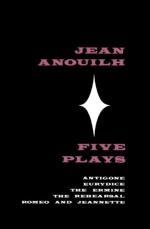|
This section contains 6,769 words (approx. 17 pages at 400 words per page) |

|
In the following essay, Nazareth discusses the Truth in tragedy and compares Anouilh's Antigone to Sophocles's Antigone.
"When Jean Anouilh turns historian we can take it that truth will be revealed in the light of the emotions lightly, wittily revealed, in brilliant flashes. But truth is no less true because it comes as a jest in a jeweled sentence." (Caryl Brahmns, in a review of Beckett's Plays and Players, August, 1961.)
"With Anouilh now firmly entrenched as purveyor of fancy goods to the entertainment hunters, it is hard to credit that, not so long ago, he was classed as a rebel... [Anouilh was] never a major writer, or even a serious thinker... Antigone will not stand up to scrutiny; [its] factitious and sentimental skating round subjects, in which the real issue is always carefully avoided, is revealed. Anouilh has not only cut history down to size, but larded...
|
This section contains 6,769 words (approx. 17 pages at 400 words per page) |

|




